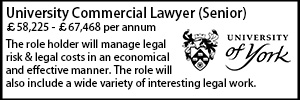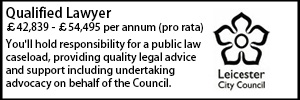Upper Tribunal rejects council application for permission to appeal Education Tribunal for Wales review decision
- Details
An Upper Tribunal judge has dismissed a Welsh council’s claim for judicial review of a review decision by the Education Tribunal for Wales (ETW) – finding that the “correct route of challenge” is by way of statutory appeal.
In Swansea City Council, R (on the application of) v Education Tribunal for Wales [2024], Upper Tribunal Judge Wright additionally refused the council permission to appeal the ETW's review decision because the appeal proceedings to which that review decision related “no longer exist”.
Introducing the case, the judge said: “The origin of Swansea City Council wishing to challenge the ETW's review decision starts with the ETW's decision of 13 November 2023 on the parents’ appeal to that tribunal.”
The parents’ appeal was against the content of a statement of special educational needs maintained by the council in respect of their son.
The judge added: “As that appeal has since been withdrawn, in October of this year, I need say no more about that appeal, save insofar as it informs the ETW's review decision.”
The parents' wished to challenge the ETW's decision of 13 November 2023 and applied to the ETW for permission to appeal. By decisions dated 22 March 2024 and 5 April 2024, the ETW dealt with that application for permission to appeal. It did so without holding any further hearing.
In addressing the application for permission to appeal, the ETW first considered, pursuant to regulation 58 of Special Educational Needs Tribunal for Wales Regulations 2012, whether to review its decision of 13 November 2023 under regulation 56 of the 2012 Regs.
The ETW reviewed the decision, set the decision aside and ordered a fresh hearing of the appeal before a differently constituted ETW.
The ETW informed the parties that its decision on review could “only be challenged by way of judicial review”.
Swansea considered the review decision to have been made on a “wrong legal basis”. It challenged the review decision by way of a claim for judicial review.
The judge noted: “The judicial review application was opposed by the ETW in its acknowledgement of service on the basis that Swansea had a right of appeal against the review decision and so had not exhausted its alternative remedies before bringing the judicial review proceedings.”
As a result of the ETW's defence to the judicial review claim, the council lodged a protective application for permission to appeal with the Upper Tribunal against the review decision.
The council argued that that the ETW erred in law because: (i) the review decision was in breach of regulation 56 of the 2012 Regs and/or was otherwise procedurally unfair; and (2) the review decision was in breach of regulation 56 and/or based on a misdirection in law and/or not one that the ETW could reasonably have taken.
Dealing first with the jurisdiction issue, Upper Tribunal Judge Wright said: “Swansea is content to leave the jurisdiction issue to the Upper Tribunal to determine. It has, however, made what it describes as some brief points on jurisdiction.
“It observes that the wording of the previous and current statutory provisions do not appear to be materially different. The council continues:
"The case of AB v Newport City Council [2022] UKUT 190 (AAC) considered this issue under the previous statutory regime and held that there was a right of appeal to the Upper Tribunal against review decisions of the tribunal.
“[…] The AB case sets out the arguments for both sides and the UT's reasoning for its conclusion. In summary, the judge appeared to accept at [52] that on the face of it, section 336ZB/section 81 'imports' the relevant provisions in the 2007 Act and so "the range of appealable decisions should be similarly restricted". This may be why the tribunal originally formed the view that the review decision could only be challenged by way of judicial review, and there is a strong argument to be made that this straightforward reading is the correct one. However, the judge then went on to say that there are "difficulties with that construction" which were then set out [53-57], before explaining his preference for the contrary submissions at [58-60], although it is submitted that that reasoning is not always easy to follow.
“To the extent practical considerations are relevant (and the observation in AB at [57] in this regard is noted), the advantage of such decisions being appealable to the Upper Tribunal like any other is simplicity, both because all appeals would go to the UT with no separate category of excluded decisions, and also because generally appeals to the Upper Tribunal are more straightforward and cheaper than claims for judicial review. On the other hand, the advantage of such challenges proceeding by way of judicial review is that the position in Wales would be the same as the position in England."
The ETW also made the following observations, as outlined by the judge:
“In the AB case, Judge Mitchell of the Upper Tribunal determined that there is a right of appeal to the Upper Tribunal against a review decision of the Special Educational Needs Tribunal for Wales under section 336ZB of the Education Act 1996.
“The Special Education Needs Tribunal for Wales was renamed as the Education Tribunal for Wales by section 91 of the Additional Learning Needs and Education Tribunal (Wales) Act 2018 in September 2021. It continues (as the Education Tribunal for Wales) to make decisions on appeals about statements of special educational needs pursuant to the special educational needs legal framework within Part IV of the Education Act 1996 and the Special Educational Needs Tribunal for Wales Regulations 2012 ('the 2012 regulations').
“The review decision was made by the Tribunal in exercise of its powers under the special educational needs legal framework, and not under the additional learning needs regime within the Additional Learning Needs and Education Tribunal (Wales) Act 2018 and the Additional Learning Needs (Wales) Regulations 2021.
“The appellate jurisdiction of the Upper Tribunal in this case is accordingly governed by the Special Educational Needs legal framework within Chapter 1 of Part IV of the Education Act 1996, and specifically section 336ZB thereof.
“It is a matter for the Upper Tribunal to determine whether the precedent in the AB case applies in this case.”
Upper Tribunal Judge Wright found that the decision in AB applied in the present case.
He said: “The decision was about challenges to review decisions by the Special Educational Needs Tribunal for Wales. However, [the] difference from this case is cosmetic only, it is not a difference of legal substance. That is made clear by the introduction to the Additional Learning Needs and Education Tribunal (Wales) Act 2018 ("the 2018 Act") which states that it is an Act, "to reform the law on education and training for children and young people with additional learning needs; and to continue the Special Educational Needs Tribunal for Wales and to rename it the Education Tribunal for Wales" (the underlining is mine and has been added for emphasis).”
He concluded that the councils claim for judicial review of the ETW's review decision must be dismissed, because the “correct route of challenge” is by way of statutory appeal.
He said: “That appeal route provides Swansea with the alternative remedy which means the judicial review is not the appropriate route to challenge that decision. Parliament has provided a right of statutory appeal to the Upper Tribunal against the review decision, and given this the judicial review claim should be dismissed.”
Finally, turning to the council’s permission to appeal application, the judge concluded: “Regardless of the potential merits of Swansea's arguments, I refuse it permission to appeal the ETW's review decision because the appeal proceedings to which that review decision related no longer exist, the arguments would thus be being decided in a vacuum and would have no consequence for either party in terms of the child's educational provision.
“If I gave permission to appeal and allowed Swansea's appeal, setting aside the review decision would require either the Upper Tribunal or the ETW to redecide the review decision. […] There could [be] no useful basis for the review decision being remade, and the lawfulness of doing so may be open to question where the appeal proceedings no longer exist.”
Having refused the council permission to appeal on the papers alone, the judge highlighted the council’s right to apply for a reconsideration of the decision refusing permission to appeal at an oral hearing before the Upper Tribunal.
He added: “I would respectfully suggest that if such an application is to be made, it will assist the judge if Swansea can explain why these proceedings are being pursued in circumstances where there are now no appeal proceedings before the ETW upon which the review decision can bite.”
Lottie Winson









































